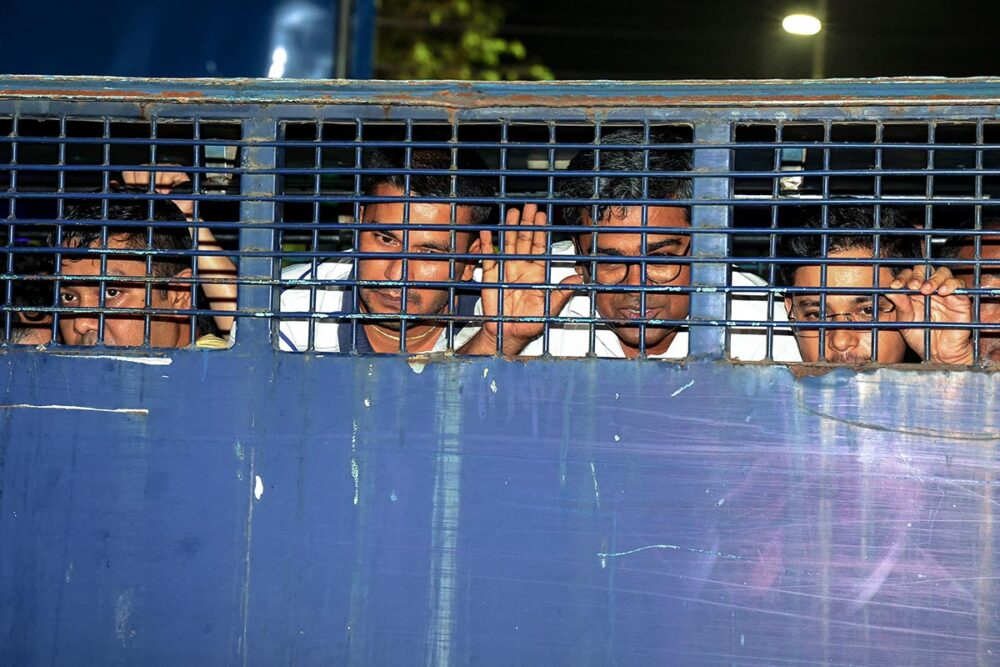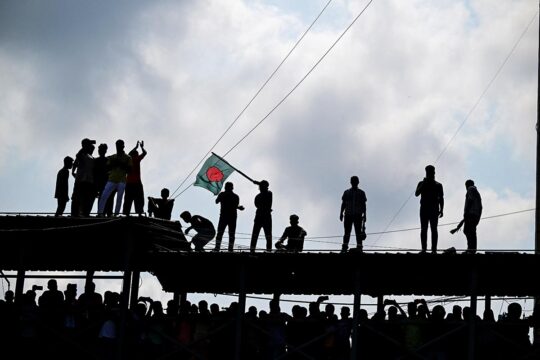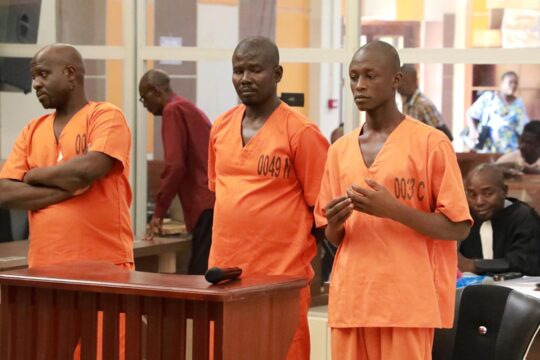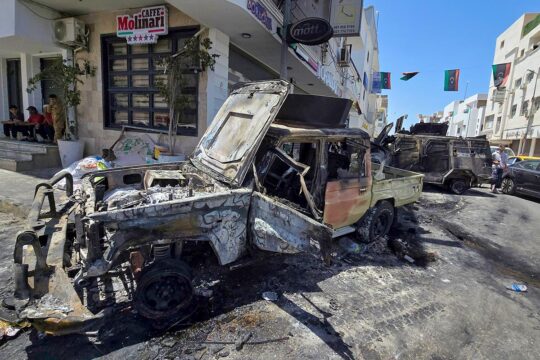Editor’s note: all the lawyers arrested were released on bail the day after this article was published, on 23 April 2025, with the exception of Tureen Afroze.
On 7 April 2025, Bangladesh police arrested 52-year-old lawyer Tureen Afroze from her house in Uttara in the capital city of Dhaka for an offence of attempted murder allegedly committed eight months earlier on 5 August 2024, the final day of the popular uprising which resulted in the fall of the Awami League government.
The arrest followed the lodging of a First Information Report (FIR) with Uttara West police station by 21-year-old Abdul Jabbar, a student who was shot that day near the BNS shopping centre building in Dhaka, the capital city of Bangladesh.
In the FIR filed on 27 March 2025, Jabbar alleged that “following the orders” of seven Awami League politicians and senior police officers named in the FIR, one of which included the former prime minister of Bangladesh Sheikh Hasina, Tureen Afroze along with 43 other named individuals congregated “and armed with deadly and lethal weapons with the intention to kill, launched a sudden and violent attack on the student protesters, opening fire indiscriminately”.
The FIR goes onto state that “one of the bullets fired by the accused struck my body below the spine and above the waist. I immediately collapsed unconscious on the road. Later, fellow protesters who were with me took me to Dhaka Medical Hospital for treatment. To this day, I continue to live an abnormal life with the bullet still lodged in my body.”
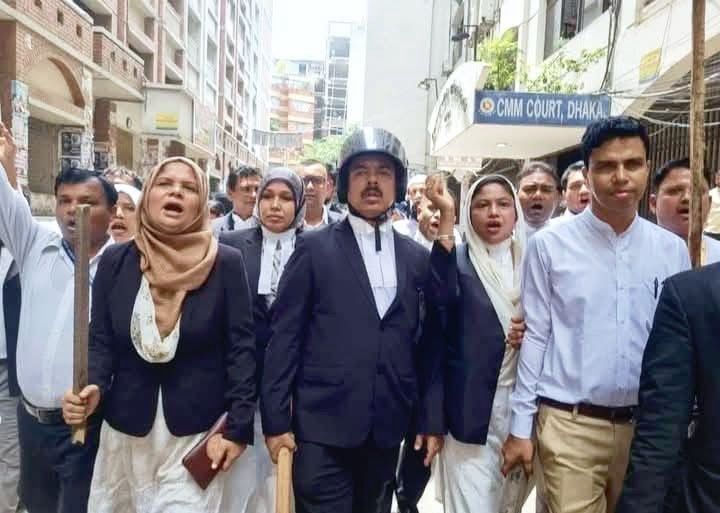
Tureen Afroze, a prosecutor prosecuted
Afroze, a strong supporter of the Awami League government, became prominent in the country after she was appointed in 2013 as a prosecutor at the International Crimes Tribunal of Bangladesh (ICT-BD), which was established three years earlier to hold trials of those accused of international crimes during the country’s 1971 war of independence. Most of those charged were leaders or supporters of the Islamic party, the Jamaat-e-Islami, which had sided with the Pakistan military during the war.
The Tribunal, which up until 2018 had convicted and sentenced 4 senior Jamaat leaders to death along with 48 other men, was strongly criticised at the time for its lack of independence and due process by international human rights groups – and Afroze played a key role in many of the trials including that of Golam Azam, the Islamic party’s leader, who received a life sentence.
In 2018, Afroze had unsuccessfully sought a ruling party nomination to stand as a member of parliament in a national election which was widely seen as systematically rigged. A year later, she was sacked from her position as prosecutor after it was revealed she had organised a secret meeting with Muhammad Wahidul Haque, a man accused of crimes during the 1971 war, and allegedly shared documents with him.
On 9 April 2025, the day after Afroze was arrested, the police brought her to the magistrates’ court that remanded her for four days into police custody for questioning. In the remand hearing, according to media reports, the public prosecutor Omar Faruq Faruqi told the court that "Tureen Afroze is a controversial figure”. “During the ‘fascist’ Hasina's rule, she made strong statements in support of Hasina, speaking against opposition movements. She actively assisted in defending ‘fascism’ through her statements,” he said.
Afroze responded by saying that “this case is fabricated”. I can provide full documentation of where I was prior to August 5. During that time, I had surgery for a tumor at the Evercare Hospital,” she said. “For the past four years, I haven't said anything in the media, haven't written anything. It is being said that I supported fascist Hasina and yet it was during her regime I was deprived of my job. I’ve been out of work for six years. I don’t understand which side I belong to.”
Political retribution disguised as criminal justice
Justice Info spoke to Jabbar about the FIR that he has lodged. He recalled when police accompanied by Awami League leaders and activists chased the protestors away. “I could not understand immediately that I had been shot with bullets but shortly afterwards I fell down on the ground and was rushed to local hospital. Physicians suspected that the bullet was fired from a height.” However, even though he had alleged in the FIR that Afroze was present that day, he acknowledged that he had not actually seen her. “About Tureen Afroze, I don’t know whether she was on the ground, but she was a 'big' leader of Awami League,” Jabbar said. “She can’t avoid her responsibility by saying that she was not on the street. We know she wrote on social media against student protesters and in favour of the fascist regime before August 5. You know she was a top ICT prosecutor.”
Afroze’s arrest reflects how certain political factions in Bangladesh, now dominant following the fall of Hasina, are obtaining retribution against their political enemies by using the legitimate process of bringing to account those actually responsible for the killings and shooting of protestors between 16 July to 5 August 2024 . “Among the many awful actions of the previous Hasina government were politically motivated prosecutions. Unfortunately, recent cases suggest that those practices are continuing, this time to target those considered to be supporters of the previous government,” Meenaskhi Ganguly, the deputy director of Human Rights Watch's Asia Division told Justice Info.
With the Awami League now out of power, and the Jamaat-e-Islami resurgent, Afroze’s high profile role in the trials at the ICT and her full-throated support for the previous government appear to have made her a target – although Jabbar told Justice Info that he was not aligned to any political party. Though there are many who are considered as legitimately detained by the Bangladesh police and courts for criminal cases relating to the July and August 2024 killings, there are also others who are in a similar position as Afroze.
Human rights activists within the country also note that Afroze’s case suggests that the criminal justice institutions under the interim government continue to make political, rather than evidence-based, decisions. “There is much talk about false cases these days, and this seems to be one such case,” Dhaka-based human rights activist Abu Ahmed Faijul Kabir told Justice Info. “We saw similar events during the past government — false cases, fabricated cases. This kind of behaviour never ensures justice; rather, from a human rights perspective, it is an extremely negative action.”
Dozens of lawyers arrested
Two days before the arrest of Afroze, another magistrate court in Dhaka sent to jail 61 lawyers, all aligned to the Awami League, in relation to a FIR filed against them for assault, vandalism, and attempted murder allegedly committed on 4 August 2024.
The FIR had been filed in February 2025 by Mohammad Ali Babu, an executive member of the Dhaka Bar Association, naming a total of 144 lawyers as accused. Babu is linked to the Bangladesh Nationalist Party (BNP), the party that was the main opposition to the Awami League between 2009 and 2024.
The FIR claims that at noon on 5 August, the Awami League lawyers assembled in front of the Dhaka Bar Association carrying home-made weapons, explosives and bombs, chanting “Sheikh Hasina is not afraid”. One lawyer is accused of pointing a gun at Babu and another of hitting him with a rod, whilst the other lawyers are accused of indiscriminately punching and kicking him. The lawyers are also accused of vandalising the rooms of lawyers belonging to the BNP.
Unlike in the case of Tureen Afroze, there is photographic evidence that Awami League lawyers assembled that day outside the court with some carrying sticks, apparently corroborating at least part of the allegation made in the FIR which also lists the names of 21 witnesses said to be present during the events.
In February, a few days after the FIR was lodged with the police, 115 of the 144 accused lawyers applied to the High Court for anticipatory bail which was granted on the condition that the lawyers surrender to the magistrates court within two months requiring them to apply again for bail. However, when 83 lawyers came to the magistrate court on 6 April, only 19 of them were given bail (including all 18 female lawyers) and 64 were remanded to prison, with three lawyers fleeing the court.
The decision by the magistrate court to refuse bail has raised concerns, particularly as the rationale for their detention was not clear, and because there was no risk of reoffending.
Barrister Tania Amir, speaking at an online Awami League event, said that the detentions showed that Bangladesh was the “only country in the world where professionals are charged with murder on false and spurious cases. This is an affront to the freedom of professions.”
However, during the Awami League period, BNP lawyers were also arrested, for far more serious offences without any supporting evidence. Senior lawyer Ruhul Quddus, aligned to the opposition BNP, told Justice Info that he did not want to say whether the magistrate court’s decision was right or wrong, but pointed out that the court had at least applied its mind, and provided bail to all the female accused, along with an elderly lawyer.


